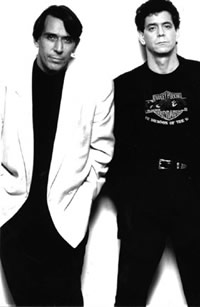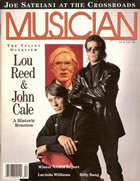

Interviews
White Light White Heat
Interview by Bill Flanagan. Published in Musician no. 126 - April 1989
Lou Reed and John Cale remember Andy Warhol

CALE: More about this spate of books: There's a question here of responsibility in narrative-that is, you don't apply moral judgments and dump responsibility on one of the characters in your book. In the way that we approached the song cycle it's more like we accept responsibility for our beliefs of what went on. We don't pass judgment.
REED: We came to understand that we were asking the audience to absorb a lot of information. They were going to be bombarded by a lot of new information, musical and lyrical, so they would have to go along with us and they would have to concentrate on it. And I thought that was really a good gift to give to the audience. John and I were talking about, "Well, what happened the first time people went to see Hamlet?" They were going to get bombarded by a lot of information.
CALE: And they were drunk! The Globe Theatre.
REED: Supposedly the people at the church were sober. All I'm trying to say is that I don't think there's anything wrong with giving them a lot of information and trying to get them to go along with the possibility of having to be an ally of this work, of having to concentrate and absorb the thing and follow it. That's part of the adventure of the show. Now, they missed all this the first time around, 20-odd years ago, when they were asked to concentrate on some stuff. So here's a little second shot for them. People have been moaning about, "Gee, I didn't see it then" or "Why isn't there a Velvet Underground reunion?" – which there isn't going to be. But there is this particular thing. And we wanted to present it in as pure a state as possible. Certainly that's my goal, to get you as close to the music and the words as possible with as little showbizzy glitz going on as there could be, and to introduce you to our friend Andy.
CALE: That theatrical device, though, is time-honored. It's one of those things that Orson Welles used a lot in his movies. He may have had a dialogue on paper, but he had all the actors talking at once in those scenes – everybody all of a sudden had to pay attention to hear exactly what everybody's point of view was, and it really pulls you right into the action.